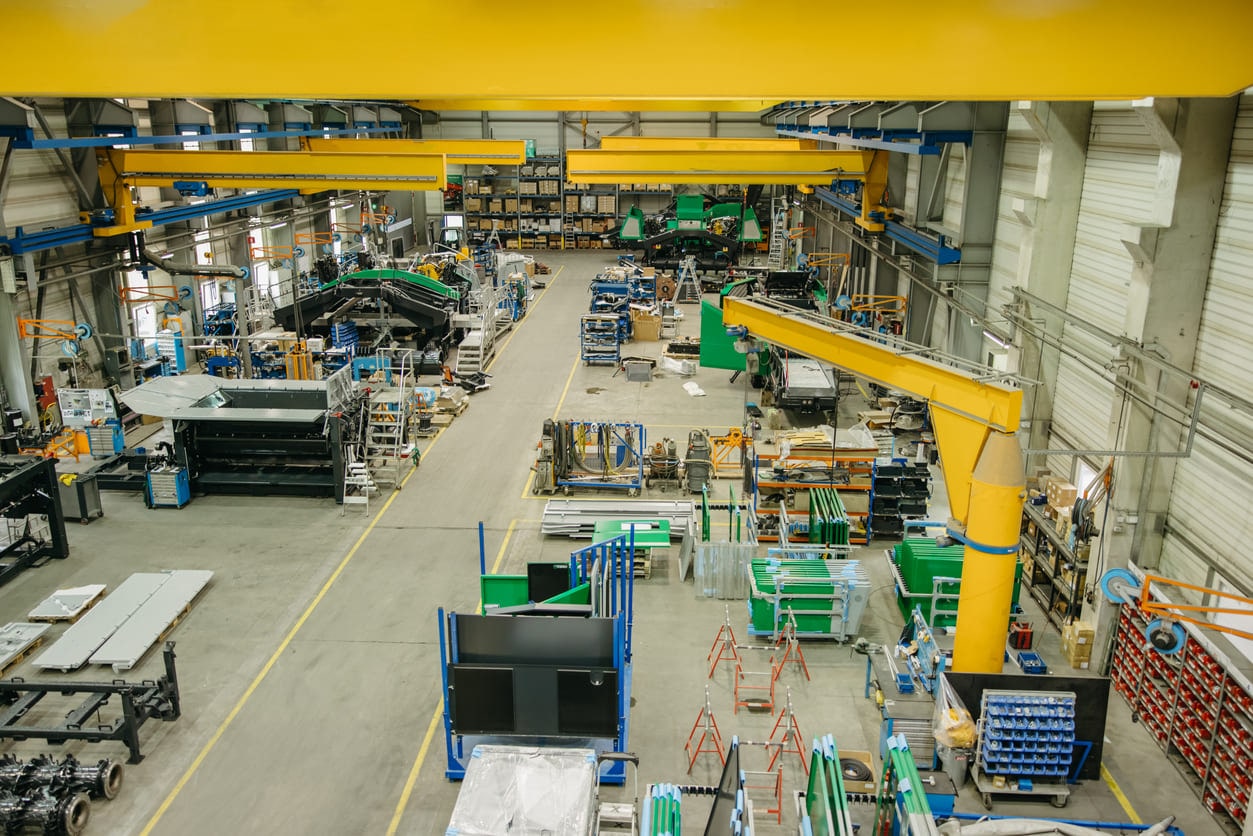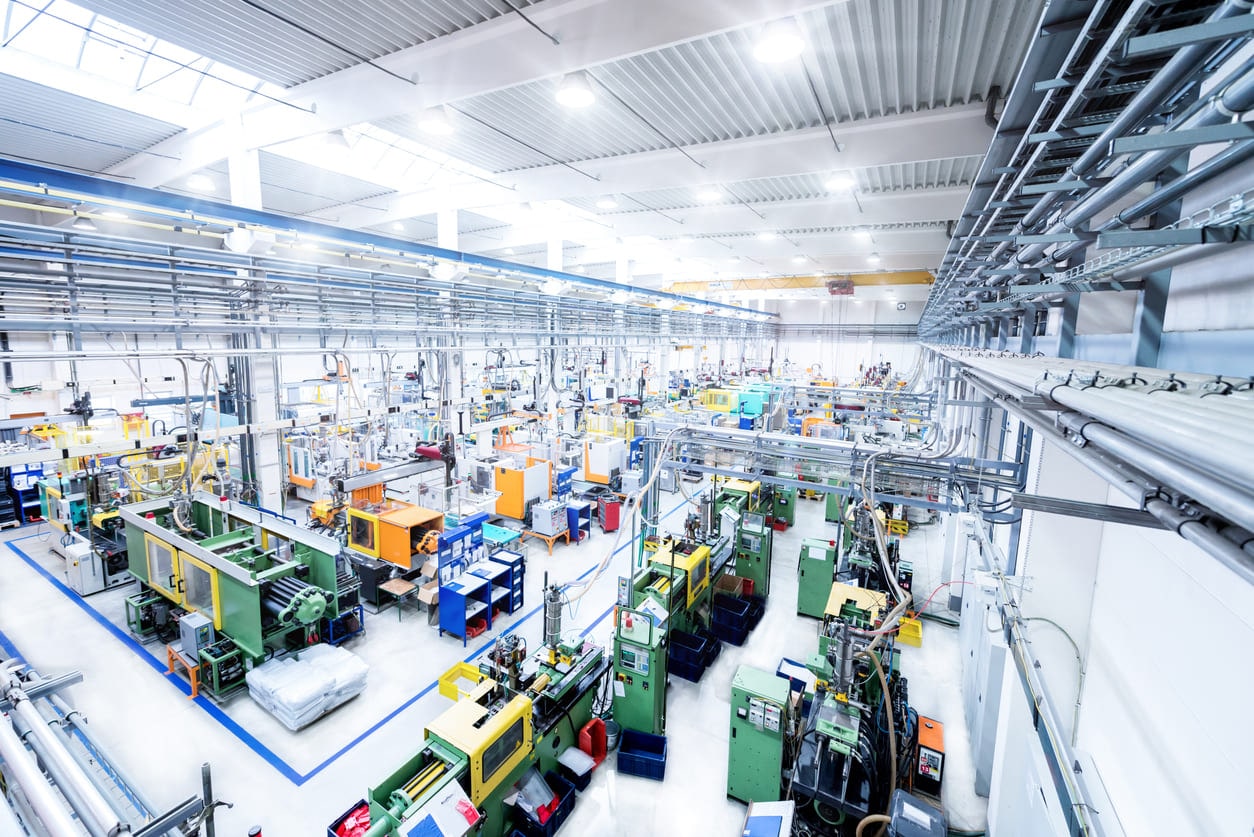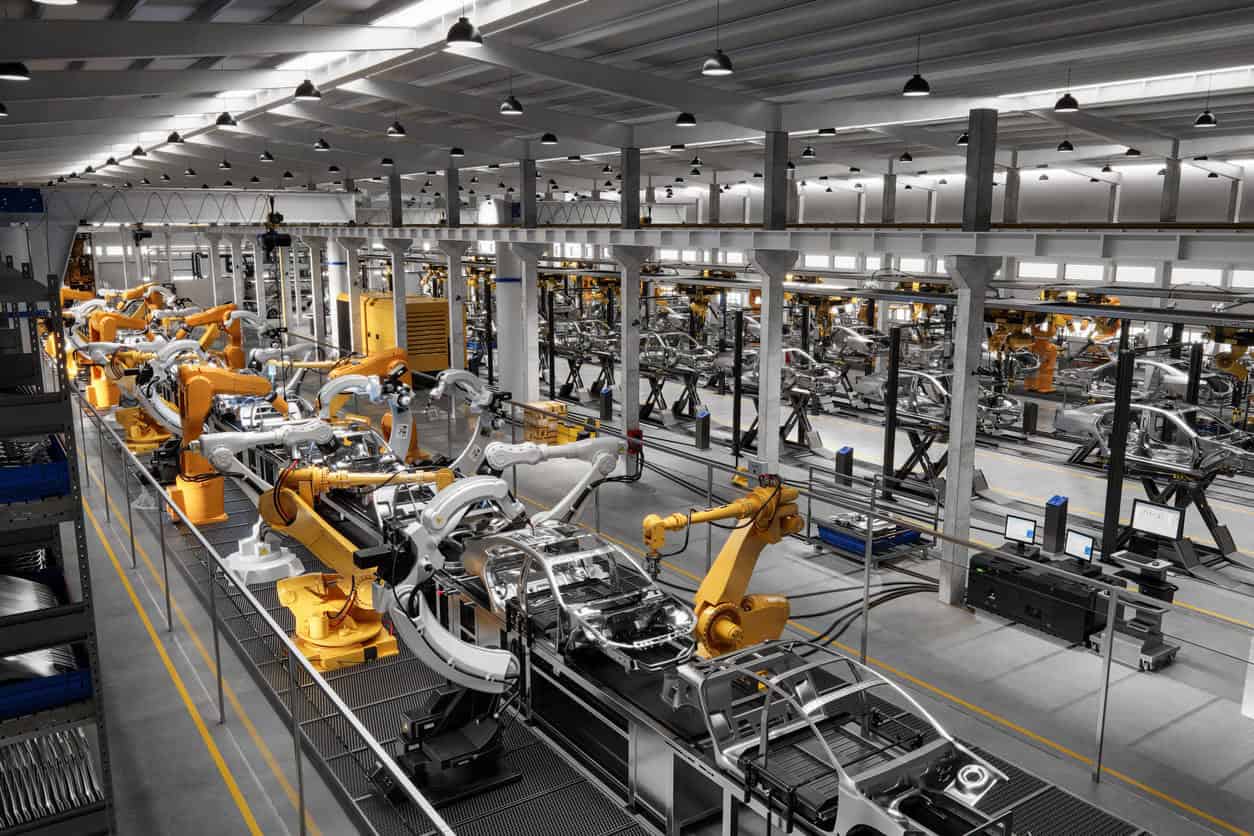BLOG

Optimising Production Lines with Industrial Air Compressors for Manufacturing
In today's high-pressure manufacturing environment, ensuring the smooth operation of your production lines is critical. Downtime due to production line optimisation issues can mean lost revenue, missed deadlines, and unhappy customers. Industrial air compressors for manufacturing play an understated but crucial role, providing a reliable and efficient source of compressed air that powers a vast array of essential equipment. This blog dives deep into the world of industrial air compressors, exploring their benefits, functionalities, and how they contribute to achieving production line optimisation for manufacturing success.
What are Industrial Air Compressors and Why Are They Essential for Manufacturing?
Industrial air compressors are the powerhouses behind countless manufacturing processes. These robust machines take in large volumes of air and compress them to high pressures. This compressed air becomes the lifeblood of your production line, powering a wide range of essential equipment.
Here's why industrial air compressors for manufacturing are essential for achieving production line optimisation and overall success:
- Boosting Efficiency and Productivity: Industrial air compressor efficiency directly translates to faster production cycles and higher output. Compared to manual or electric alternatives, tools powered by compressed air operate with greater speed and precision. This translates to significant time savings and increased production capacity.
- Minimising Downtime and Delays: Reliable air compressors are the backbone of uninterrupted production. With proper maintenance, they provide a constant and dependable source of compressed air, minimising the risk of disruptions and equipment failures that can lead to costly downtime and missed deadlines.
- Reducing Production Costs and Increasing Profitability: Cost-effective production solutions are a priority for any manufacturer. Energy-efficient air compressors not only contribute to faster production but also consume less energy. This translates to significant cost savings on your energy bills in the long run, ultimately boosting your profitability.
In essence, industrial air compressors are a crucial investment for any manufacturing operation. They play a vital role in optimising production lines, enhancing efficiency, reducing downtime, and keeping your business running smoothly and profitably.
Unveiling the Different Types of Industrial Air Compressors
The manufacturing landscape boasts a diverse range of industrial compressor types, each suited for specific applications. Here's a breakdown of the most common varieties:
Rotary Screw Compressors:
Renowned for their reliability and continuous operation, rotary screw compressors are a popular choice for high-volume production facilities.
Piston (Reciprocating) Compressors:
These versatile compressors are well-suited for smaller-scale applications or situations requiring intermittent air usage.
Centrifugal Compressors:
Ideal for large-scale industrial settings, centrifugal compressors deliver exceptional air volume at high pressure.
Oil-free Compressors:
Manufacturing processes demanding contamination-free air, like food and electronics production, rely on oil-free compressors to ensure product purity.
Portable Compressors:
Offering unmatched flexibility, portable compressors provide a temporary source of compressed air for on-site maintenance or remote operations.
The Powerhouse in Action: Exploring Air Compressor Applications in Production Lines
Industrial air compressors for manufacturing are the unseen heroes behind countless processes. They provide a reliable and efficient source of compressed air that breathes life into a vast array of pneumatic machinery benefits. Let's explore some key applications where industrial air compressors play a vital role in production line optimisation:

Powering Pneumatic Machinery and Tools:
Production line efficiency hinges on speed and precision. Pneumatic tools powered by compressed air excel in this regard. From the forceful impact of assembly line wrenches to the delicate touch of paint spray guns, compressed air delivers the power needed for a wide range of tasks. This translates to faster operation, improved quality control, and ultimately, increased production output.
Fueling Automation Systems and Robotics:
To remain competitive, manufacturers prioritise the efficiency of their automation systems. Industrial robots heavily rely on compressed air for actuation and movement. The precise control and power of compressed air enable robots to perform complex tasks with speed and consistency, contributing to a streamlined and efficient production process.
Maintaining Smooth Material Handling:
Production line optimisation requires seamless movement of materials from one stage to the next. Industrial air compressors play a crucial role in operating conveyor belts, pneumatic lifts, and other material-handling equipment. Compressed air ensures a steady flow of materials throughout the production line, minimising delays and bottlenecks that can disrupt production.
Ensuring Quality Control:
Consistent quality standards are an absolute priority in manufacturing. Air-powered tools are frequently used for product inspection and testing procedures. From leak detection equipment to automated testing systems, compressed air provides the power and control needed to ensure every product meets your rigorous quality standards.
By powering these essential applications, industrial air compressors for manufacturing contribute significantly to production line optimisation. They ensure efficient operation, improve product quality, and ultimately, empower manufacturers to achieve their production goals.
Selecting the Perfect Match: Factors to Consider When Choosing an Industrial Air Compressor
Selecting the ideal industrial air compressor for manufacturing is crucial for production line optimisation. The right compressor ensures you have a reliable and efficient source of compressed air that meets the specific demands of your operation. Here are some key factors to consider when making this important decision:
1. Compressor Size and Capacity:
Compressor size and capacity considerations are paramount. You need a compressor with sufficient output to meet the combined air demand of all your pneumatic machinery benefits. This involves analysing the air pressure and flow rate requirements of each tool and machine on your production line. Choosing a compressor with the right capacity ensures you have enough compressed air to power your equipment efficiently without overspending on unnecessary power.
2. Air Pressure and Flow Requirements:
Different applications require varying air pressure and flow rates. For instance, powering impact wrenches requires high pressure, while paint spray guns function best with a steady flow of air at a moderate pressure. Understanding these air pressure and flow requirements for each piece of equipment on your production line is essential. By matching the compressor's capabilities to your specific needs, you ensure optimal performance and avoid inefficiencies.
3. Energy Efficiency and Power Consumption:
Energy-efficient air compressors are a win-win for your business and the environment. They consume less energy to operate, which translates to lower energy bills and a reduced carbon footprint. Look for compressors with features like variable speed drives that adjust power consumption based on actual air demand. Energy-efficient air compressors contribute to sustainable production practices and help you achieve your environmental goals.
4. Noise Levels and Environmental Considerations:
Industrial air compressors can generate noise. It's crucial to choose a model with noise levels that comply with your workplace regulations and create a safe and comfortable working environment for your employees. Additionally, consider eco-friendly compressor options whenever possible. These compressors may utilise features like sound enclosures or advanced lubrication systems to minimise noise pollution and environmental impact.
By carefully considering these factors, you can select the ideal industrial air compressor for manufacturing. It will ensure production line optimisation, improve efficiency, and contribute to a sustainable and successful manufacturing operation.
Maintaining Peak Performance: Air Compressor Care Tips
Just like any hardworking piece of equipment, industrial air compressors for manufacturing require regular maintenance to ensure reliable operation and optimal performance. Production line optimisation depends on having a well-maintained compressor that delivers a consistent and efficient flow of compressed air. Here are some essential industrial air compressor maintenance tips to keep your compressor running smoothly:
1. Regular Inspection and Servicing:
Schedule routine inspections and servicing by qualified technicians. Regular inspections allow technicians to identify potential problems like leaks, worn components, or excessive condensation before they escalate into major breakdowns. Preventative maintenance is crucial for maximising the lifespan of your compressor and avoiding costly repairs down the road.
2. Lubrication and Filter Replacement:
Industrial air compressors rely on proper lubrication to minimise friction and wear on internal components. Follow the manufacturer's recommendations for lubrication schedules and lubricant types. Regular filter replacements are also essential. Dirty air filters restrict airflow and reduce compressor efficiency. By adhering to a consistent lubrication and filter replacement routine, you ensure optimal performance and prevent unnecessary wear and tear on your compressor.
3. Proactive Troubleshooting:
Familiarise yourself with common troubleshooting techniques for minor compressor issues. Consult your owner's manual or manufacturer's website for guidance on identifying and resolving basic problems. For example, you might be able to address a pressure drop by replacing a worn air filter. However, for complex problems or any safety concerns, always consult a qualified professional.
4. Safety Precautions for Optimal Operation:
Safety precautions are paramount when operating and maintaining industrial air compressors. Implement safety protocols for your employees, including proper training on safe compressor operation and lockout/tagout procedures before performing maintenance. Always wear recommended personal protective equipment (PPE) when working near the compressor.
By following these essential industrial air compressor maintenance tips, you can ensure your compressor operates at peak performance, avoid costly downtime, and extend its lifespan. Remember, a well-maintained compressor is a key player in achieving production line optimisation and overall manufacturing success.
Case Studies: Optimising Production with Industrial Air Compressors in Australia
The power of industrial air compressors for manufacturing in optimising production lines is undeniable. Here are a couple of compelling case studies that showcase the impact, along with highlighting Australian resources for similar production line optimisation.
Reduced Energy Consumption in Food Processing:
A food processing plant in Indonesia faced rising energy costs associated with its compressed air system. A study by the Institute of Physics explored their compressed air system optimisation journey. The process involved analysing air demand patterns, identifying leaks, and implementing efficient control strategies for their air compressors. The results were impressive, with a 15% reduction in energy consumption. This case study highlights the significant cost-saving potential of optimising compressed air systems in manufacturing.
Improved Efficiency in Automotive Parts Production:
Another case study, detailed by Plant Services, explores the experience of an automotive parts manufacturer. They upgraded their ageing air compressor system to a more efficient model with features like variable speed drives and improved control systems. The results were a 20% reduction in energy consumption and a noticeable improvement in production line uptime. This case study underlines the significant impact industrial compressor types can have on overall manufacturing efficiency.
Australian manufacturers can achieve similar results by partnering with reputable industrial air compressor suppliers like Titan Air Compressors to explore air compressor upgrades and system optimisation strategies.
These case studies demonstrate the tangible benefits of leveraging industrial air compressors effectively. Production line optimisation, cost savings, and improved efficiency are all achievable through the proper selection, operation, and maintenance of compressed air systems. By considering the Australian context and highlighting relevant resources, this section provides a more localised and actionable perspective for Australian readers.

The Future of Air Compressors: Innovation and Sustainability
The world of industrial air compressors is constantly evolving, driven by advancements in technology and a growing focus on environmental responsibility. Here's a glimpse into what the future holds:
- Advances in Compressor Design and Efficiency: Manufacturers are continuously developing industrial compressor types with improved efficiency, lower energy consumption, and quieter operation. Expect to see more intelligent control systems and variable speed drives that optimise performance based on real-time air demand.
- Smart Technology Integration for Real-time Compressor Monitoring: Smart technology in air compressors is on the rise. Integration of internet-of-things (IoT) capabilities will enable real-time monitoring of compressor performance, allowing for predictive maintenance, remote troubleshooting, and data-driven optimisation of production processes.
- Sustainability Initiatives and Eco-friendly Compressor Options: Manufacturers are prioritising the development of eco-friendly compressor options. This includes exploring alternative lubricants, utilising waste heat for other processes, and incorporating energy-efficient components to minimise environmental impact.
Conclusion: Optimising for Success with Industrial Air Compressors
Industrial air compressors for manufacturing are the unsung heroes of the production line. They're not just machines – they're the silent drivers of efficiency and productivity. By providing a reliable source of compressed air, they power a vast array of equipment, ultimately contributing to your bottom line through:
- Boosted Production:Increase output and elevate your manufacturing capabilities to new heights.
- Minimised Downtime: Reduce disruptions and keep your lines running smoothly, maximising production time.
- Cost Savings: Energy-efficient air compressors translate to significant cost savings over the long term.
Don't settle for production line optimisation solutions that only address the surface. By understanding industrial compressor types, their applications, and selection factors, you can harness the full power of compressed air to gain a lasting competitive edge.
Implement the air compressor maintenance tips outlined in this blog, and stay informed about future advancements in compressor technology. By taking a proactive approach, you'll ensure smooth operation, a sustainable future, and a production line that thrives on the power of optimised compressed air.
Ready to unlock the hidden potential within your facility? Titan Air Compressors, a South Australian company with over 19 years of experience in the air compressor industry, can be your trusted partner in production line optimisation. They offer a comprehensive selection of all makes and models of air compressors, ensuring you find the perfect fit for your specific needs. Arrange for a free quote or contact us at 0451 499 733 today to discuss your project and take the first step towards transforming your production line with the power of compressed air.

